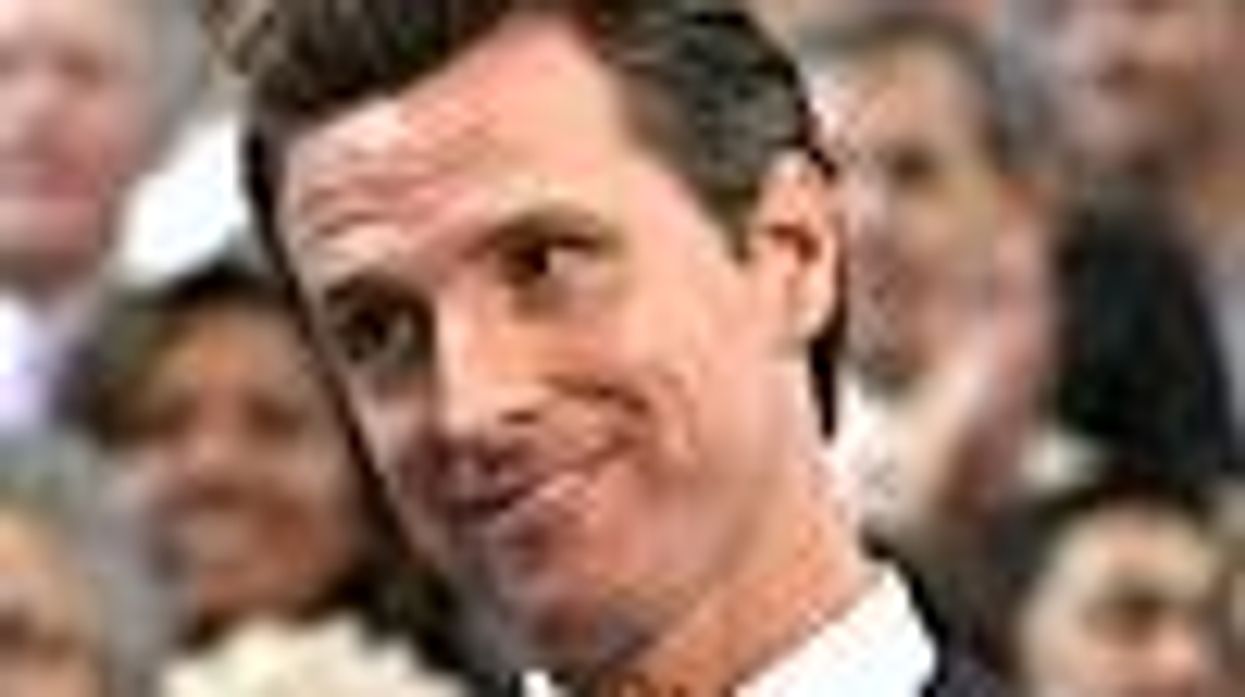San Francisco
mayor Gavin Newsom has taken his first public step toward
seeking higher office, filing papers to form an exploratory
committee for a potential gubernatorial bid in 2010.
Newsom, a
Democrat best known for challenging California's ban on
same-sex marriage in 2004, is six months into his second and
final term, which expires in 2011. Speculation over
whether he would run to succeed Gov. Arnold
Schwarzenegger has pursued him since before his reelection,
but the mayor always deflected it by saying his attention
remained fixed on the city.
The establishment
of an exploratory committee will allow Newsom,
40, to start raising money and conducting polls. In
announcing the committee Tuesday, Newsom's campaign
consultant, Eric Jaye, said it demonstrated the
mayor's custom of ''listening to people before acting''
and that it would allow him to launch a campaign ''from a
position of knowledge and strength.''
''He is looking
forward to having a dialogue with Californians about
their future in the coming few months,'' Jaye said in a
statement.
If he ends up
entering the race, one of Newsom's opponents for the
Democratic nomination could be a man 30 years his senior:
Atty. Gen. Jerry Brown, who previously served as
governor from 1975 to 1983. Brown has said he's
thinking about trying to reclaim the job. (He can run again
because current term limits were not in place when he was
governor).
Brown, 70, hasn't
established an exploratory committee devoted to the
governor's race, but he has changed the name of his campaign
committee from Jerry Brown for Attorney General to
Jerry Brown 2010. The committee reported taking in
more than $200,000 in donations during the last two
weeks.
Newsom has
$250,000 left over from his mayoral campaign, but the new
gubernatorial committee won't have to file its first
campaign disclosure report until the end of the year,
according to Jaye.
Newsom made
headlines early in his first term when he directed city
workers to grant marriage licenses to gay couples, three
months before Massachusetts became the first U.S.
state to legalize same-sex marriage.
Some Democrats,
including California's senior U.S. senator, Dianne
Feinstein, blamed him for helping fuel a conservative
backlash that propelled President Bush to reelection
that same year, while some political observers
speculated that he may have irrevocably doomed his
chance to secure a statewide office.
With the passage
of time, though, his position has seemed less
revolutionary. The California supreme court, which four
years earlier had nullified the gay marriages
performed in San Francisco, struck down the state's
ban on same-sex nuptials in May.
Besides his
reputation as a same-sex-marriage advocate, Newsom has won
praise and imitators in other cities for programs to get
homeless people into housing. He has also been lauded
for his commitment to social services, including the
promotion of tap water over bottled water and the
distribution of employer-subsidized health care for
uninsured residents.
Meanwhile, a trio
of former Silicon Valley millionaires are eyeing the
Republican nomination to succeed Schwarzenegger, who is
barred by law from seeking a third term.
Insurance
Commissioner Steve Poizner is at the head of the pack. He
signaled his interest in the governorship early, pumping
$2.5 million of his own money into a campaign against
a November term limits initiative that would have
allowed a handful of powerful Democrats to stay on in
Sacramento.
Since then he's
crisscrossed the state, holding public events on
insurance rate reductions for consumers and touting
crackdowns on insurance scofflaws. He's also appeared
with the governor at disaster zones in the wake of
wildfires.
Former
Hewlett-Packard CEO Carly Fiorina, who is working the
California fund-raising circuit on behalf of presumed
GOP presidential nominee John McCain, has also been
mentioned as a possible candidate. Another name
floated for the state's top job is former eBay president Meg
Whitman, who became a national cochair of the McCain
campaign after serving as Mitt Romney's finance
chairwoman.
Dan Schnur, a
Republican media strategist not affiliated with any
potential candidate, said both Brown, with his strong name
recognition, and Newsom, with his solid liberal
credentials, would be strong primary contenders.
''The
conventional wisdom is that the same-sex marriage issue is a
double-edged sword for Newsom, but I'd argue that it makes
him the most likely Democratic nominee,'' Schnur said.
''An issue like this in the Democratic primary gives
him an ability to break out of the pack.'' (Lisa
Leff, AP)





































































Charlie Kirk DID say stoning gay people was the 'perfect law' — and these other heinous quotes